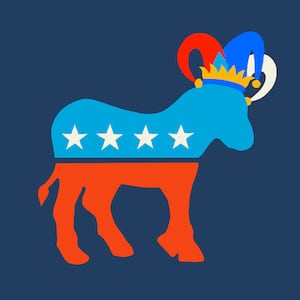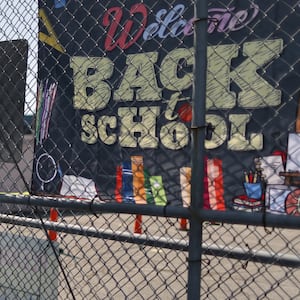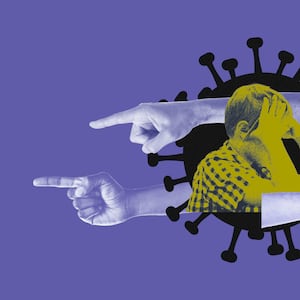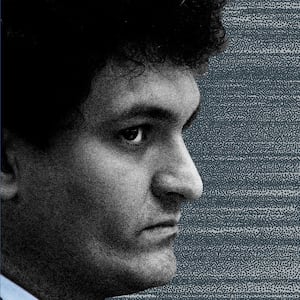Derek Chauvin, the policeman who killed George Floyd in Minneapolis in 2020, had a history of citizen complaints and was thought to be “tightly wound,” not a trait ideal for someone patrolling the streets with a deadly weapon. But under the police union’s collective bargaining agreement, the police commissioner lacked the authority to dismiss Derek Chauvin, or even to reassign him.
There’s near zero accountability in America’s police departments. A 2017 Washington Post report on police discipline examined data from 37 large cities and found a dismissal rate of less than two-tenths of 1 percent, or 130 officers per year out of 91,000.
Democracy is designed as a process of accountability. Voters elect governors and mayors to deliver public services effectively, and, if they disappoint, voters hold them accountable at the next election. To fulfill their constitutional obligations, elected executives must be empowered to manage public employees. Democracy can’t work, as James Madison put it, without an unbroken “chain of dependence…[from] the lowest officers, the middle grade, and the highest.”
Accountability is near zero not only with police, but across all levels of American government.
Over 99 percent of federal employees are rated “fully successful.” Stanford political scientist Terry Moe compiled teacher termination data in his 2011 book, Special Interest. In New York City, “eight teachers out of a total teaching force of 55,000 were dismissed for poor performance in 2006–07: a dismissal rate of about one one-hundredth of one percent.”
Accountability is commonly misunderstood as mainly involving the rights of an employee. But how about the rights of students to be protected against lousy teachers, and the harm to the public of abusive cops? How about the rights of all the good cops and good teachers who are discouraged by having to work with people who don’t do the job?
Democracy can’t work without accountability. Public trust is also impossible without accountability. Relations between police and minority communities is a powder keg. That’s why the killing of George Floyd touched off national riots.

Former Minneapolis police officer Derek Chauvin stands after a jury finds him guilty of all charges in his trial for second-degree murder, third-degree murder and second-degree manslaughter in the death of George Floyd in Minneapolis, Minnesota, April 20, 2021.
Pool via ReutersGoverning Under Union Controls
Unaccountability is just the tip of the union iceberg. Since the 1960s, when collective bargaining was mandated in the federal government and most states, union controls over government operations allow unions to veto basic daily management choices.
Union controls are designed for inefficiency—requiring, for example, a special crew to remove an overhanging branch instead of letting the transit repair crew take care of it. Studies suggest that public services cost two to three times what private contractors require.
Instead of pride, unions enforce a culture of entitlement in many schools and agencies. Employees are ostracized if they strive to do more than the bare minimum. A study by Johns Hopkins University of Providence, Rhode Island, schools found peer pressure against “‘going the extra mile’” which “makes everyone look bad.” The study’s authors also wrote: “Specifically, we heard, ‘Unions discriminate against hard work. They put pressure on those who go above the bare minimum and ask ‘why?’ if you want to do more. This is not only teachers, but secretaries and custodians.”
This union culture of negative entitlement was on full display during the pandemic. While nurses, grocery clerks, and other essential workers continued to work, many teachers unions refused to come back to schools for two years. Remote learning wasn’t even a given in a lot of places. In Brevard County, Florida, teachers ended up only teaching three hours per day.
Chicago Mayor Lori Lightfoot tried for over a year to get teachers back to schools, only to be met with refusals and additional demands. The teachers union, she concluded, would “like to take over not only Chicago Public Schools, but take over running the city government.”
The Moral Imperative of Good Government
Political parties tend to debate policies, such as climate change and inequality. But how government works day to day is probably of greater concern to most voters. Is government delivering good schools? Are police trustworthy? Is government spending tax dollars wisely?
The Constitution provides a framework of authority aimed at running government effectively. There’s a “constitutional need,” as Justice Stephen Breyer noted, “effectively to implement the public’s democratically determined will.” Instead, almost without anyone noticing how, public unions started operating government for their own benefit.
Unions argue that procedures for accountability are “just a matter of due process.” But the process of accountability is so stacked under union rules—for example, letting a policeman under investigation review everyone else’s statements before being interviewed—that police chiefs don’t even try for dismissal except in the most outrageous cases. Even then, termination or discipline is often overturned by arbitrators who, under union contracts, have been approved by unions. Between 2006 and 2017, over 70 percent of San Antonio, Texas police officers fired for cause were rehired on appeal to arbitration.
Every public dollar involves a moral choice. A dollar squandered is a dollar not available to care for someone who is needy or hungry. Inefficient work rules are like burning money. It should be unacceptable that trash collection in New York and other big cities costs twice what private carters charge.
The purpose of government is to serve the public—as the Constitution provides, to “promote the general Welfare.” But public unions have a different agenda. Refusing to return to the classroom for two years during the COVID pandemic caused a drop of 17 percentile points in the knowledge of underprivileged third graders, compared to the pre-COVID period. This loss of learning, experts believe, is unlikely to be recovered. A generation of underprivileged youth has been irreparably harmed by teachers union recalcitrance.
The public harms caused by union controls are not episodic but endemic. Nothing much works in American government as it should. Waste is everywhere. Accountability is nowhere. A student stuck in lousy schools won’t have a chance. This should be a scandal. Good government has become a kind of joke.
Rewinding the Tape
Public union controls are, instead, accepted as a state of nature. What can we do about it? This is just what unions do. But that’s not accurate. Trade unions don’t work this way. Inefficient work rules and unmanageability would cause the business to fail, or move jobs elsewhere. Trade unions learned this the hard way with American automakers in the 1970s.
Public unions, by contrast, bear no cost by milking the system.
Government can’t move away. Shameful inefficiency is not the result of arms-length bargaining, but collusion. Public unions devote massive resources to get officials elected, and then sit down at the bargaining table with those same officials and make their demands. As a labor leader put it, we “elect our own boss.” It’s not genuine bargaining. It’s a pay-off.
There’s a reason liberals do and say nothing about it.
Public unions are the largest and most powerful political supporters of the Democratic Party. Ten percent of delegates to the Democratic National Convention are members of teachers unions. With 7 million members and billions in annual dues, public unions can direct massive resources against any would-be reformer. Union political tactics are brutal. No Democrat, and few Republicans, will take them on.
That’s why the cure is not political, but constitutional.

Educators, parents, students, and supporters of the Los Angeles teachers strike wave and cheer in Grand Park on January 22, 2019 in downtown Los Angeles, California.
Scott Heins/Getty ImagesThe Constitutional Flaw in Public Unions
The statutes in the 1960s and 1970s authorizing collective bargaining and imposing other restrictions on executive power have a fatal constitutional defect: They preempted democratic governance. Voters elect a president, governors, and mayors who no longer have the executive powers needed to run government.
It is a basic principle of our constitutional republic, applicable to state and local government, that government cannot delegate to private parties essential governing choices. “The power of governing is a trust committed by the people to the government,” the Supreme Court held in Stone v. Mississippi, “no part of which can be granted away.”
Several specific provisions of the Constitution safeguard against the delegation of sovereign powers. Article II grants “executive power” to the president, and numerous cases have held that Congress lacks authority to remove the president’s ability to hold inferior officers accountable. Article IV provides that “the United States shall guarantee to every state in this Union a Republican Form of Government.” The purpose of this “Guarantee Clause,” Madison explained, was to require a linkage between voters and the people making governing decisions, thus preventing the ceding of powers to nobles or other “favored class.”
Democracy can’t work when accountability has been removed, when work rules and veto powers preclude effective use of public resources, and when unions flex political power to harm the public good. Public employees owe a fiduciary duty to serve the public, not demand rights that harm the public. This is why FDR, a vigorous advocate for labor unions, believed that “the process of collective bargaining, as usually understood, cannot be transplanted into the public service.”
It’s time to recognize what has been hiding in plain sight: Collective bargaining in the public sector has undermined constitutional governance. There’s no hope of restoring trust to police, fixing bad schools, or marshalling resources for the public good, until democratic authority is restored to government operations. That’s why liberals should oppose public unions.










